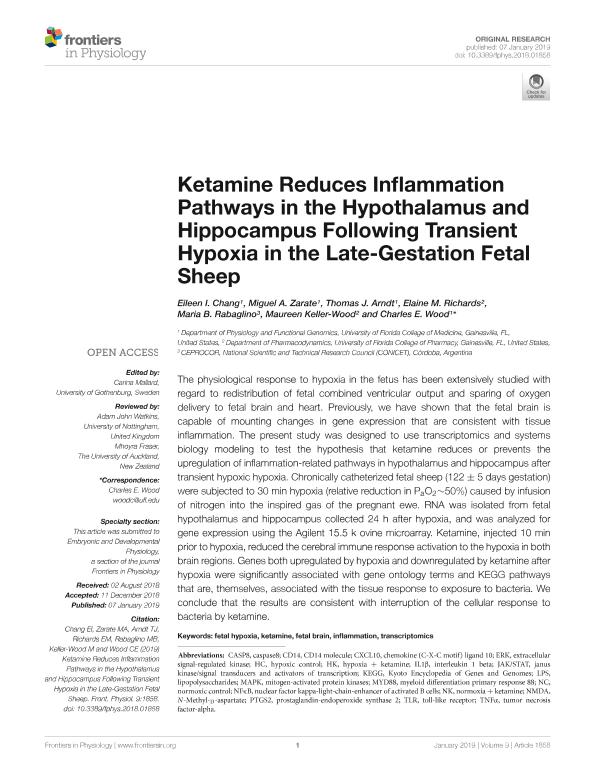Artículo
Ketamine reduces inflammation pathways in the hypothalamus and hippocampus following transient hypoxia in the late-gestation fetal sheep
Chang, Eileen I.; Zarate, Miguel A.; Arndt, Thomas J.; Richards, Elaine M.; Rabaglino, Maria Belen ; Keller Wood, Maureen; Wood, Charles E.
; Keller Wood, Maureen; Wood, Charles E.
 ; Keller Wood, Maureen; Wood, Charles E.
; Keller Wood, Maureen; Wood, Charles E.
Fecha de publicación:
07/01/2019
Editorial:
Frontiers Media S.A.
Revista:
Frontiers in Physiology
e-ISSN:
1664-042X
Idioma:
Inglés
Tipo de recurso:
Artículo publicado
Clasificación temática:
Resumen
The physiological response to hypoxia in the fetus has been extensively studied with regard to redistribution of fetal combined ventricular output and sparing of oxygen delivery to fetal brain and heart. Previously, we have shown that the fetal brain is capable of mounting changes in gene expression that are consistent with tissue inflammation. The present study was designed to use transcriptomics and systems biology modeling to test the hypothesis that ketamine reduces or prevents the upregulation of inflammation-related pathways in hypothalamus and hippocampus after transient hypoxic hypoxia. Chronically catheterized fetal sheep (122 ± 5 days gestation) were subjected to 30 min hypoxia (relative reduction in PaO2∼50%) caused by infusion of nitrogen into the inspired gas of the pregnant ewe. RNA was isolated from fetal hypothalamus and hippocampus collected 24 h after hypoxia, and was analyzed for gene expression using the Agilent 15.5 k ovine microarray. Ketamine, injected 10 min prior to hypoxia, reduced the cerebral immune response activation to the hypoxia in both brain regions. Genes both upregulated by hypoxia and downregulated by ketamine after hypoxia were significantly associated with gene ontology terms and KEGG pathways that are, themselves, associated with the tissue response to exposure to bacteria. We conclude that the results are consistent with interruption of the cellular response to bacteria by ketamine.
Palabras clave:
FETAL BRAIN
,
FETAL HYPOXIA
,
INFLAMMATION
,
KETAMINE
,
TRANSCRIPTOMICS
Archivos asociados
Licencia
Identificadores
Colecciones
Articulos(INICSA)
Articulos de INSTITUTO DE INVESTIGACIONES EN CIENCIAS DE LA SALUD
Articulos de INSTITUTO DE INVESTIGACIONES EN CIENCIAS DE LA SALUD
Citación
Chang, Eileen I.; Zarate, Miguel A.; Arndt, Thomas J.; Richards, Elaine M.; Rabaglino, Maria Belen; et al.; Ketamine reduces inflammation pathways in the hypothalamus and hippocampus following transient hypoxia in the late-gestation fetal sheep; Frontiers Media S.A.; Frontiers in Physiology; 10; JAN; 7-1-2019
Compartir
Altmétricas



